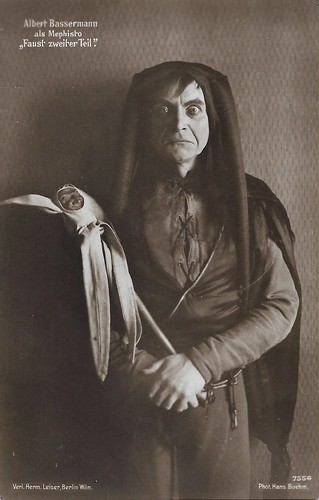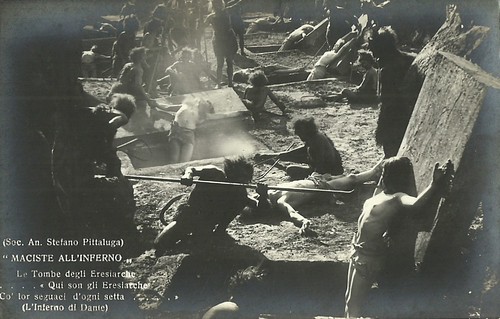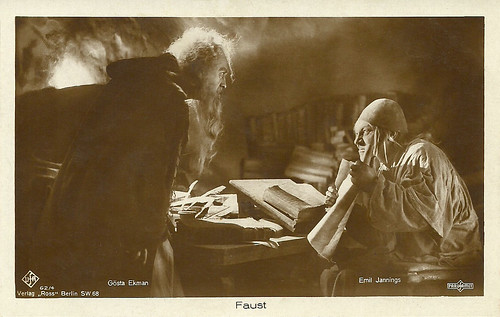
German postcard by Ross Verlag, no. 62/2. Photo: Parufamet / Ufa. Emil Jannings as Mephisto and Yvette Guilbert as Marthe in Faust (Friedrich Wilhelm Murnau, 1926).

Russian postcard, no. 496. Photo: Feodor Chaliapin as Mephisto in a stage production of Arrigo Boito's opera 'Mefistofele'. Collection: Didier Hanson.

German postcard by Verlag Hermann Leiser, no. 1621. Photo: Hans Böhm. Caption: Paul Wegener as Mephisto.

German postcard by Photochemie, no. K.1577. Photo: Nordisk Films Compagni. Gunnar Tolnaes as Doktor Voluntas a.k.as. Mephisto in Doktor X/Doktor Voluntas/The Master Physician (Robert Dinesen, 1915). This image is a variation on a film still, in which background and extras from the still are removed. See Dansk Film Institut, photo no. 4. The film was the debut of Gunnar Tolnaes at Nordisk and on the silent screen in general.

Italian postcard. Ed. A. Traldi, Milano. Photo: Bartolomeo Pagano as Maciste in the centre in the Italian silent film Maciste all'inferno/Maciste in Hell (Guido Brignone 1926). The man left with the crown is Umberto Guarracino as Pluto, King of Hell.
Faust
The name Mephistophiles is already mentioned in 'Praxis Magia Faustiana', printed in Passau in 1527, and in the anonymous 'Faustbuch' from 1587. Mephistopheles also appears as a character in several collections of stories about Faust published from the late 16th century onwards.
There has been much speculation about the meaning of the name. In Greek mē "not", phōs "light" and philos "lover" the name can be understood as "he who shuns the light", a parody of the name of Lucifer. A connection has also been made with the Hebrew mephistoph, "destroyer of good", and Mephitis was the goddess of stench in Ancient Greece.
Johann Wolfgang Goethe is said to have read a version from 1725, which inspired him to write his world-famous book 'Faust, Eine Tragödie' (Urfaust, Faust I, Faust II). As the antagonist in Goethe's Faust tragedy, Mephisto tries to make a bet with God. He says that he will succeed in dissuading Doctor Heinrich Faust from the right path. According to a subsequent agreement with Faust himself, this would be achieved if Faust found a moment so beautiful that he wanted to hold on to it permanently.
Mephisto's central role in Goethe's book certainly contributed to his enduring fame, but there were more famous writers who mentioned Mephistopheles in their work. For example, Christopher Marlowe's play 'The Tragical History of Doctor Faustus' was published in 1604, in which a demonic character named Mephistophilis appears before Faust.
The novel 'Mephisto' by Klaus Mann, published in 1936 in exile, tells the story of the actor Hendrik Höfgen (based on Gustaf Gründgens), who comes to terms with those in power during the National Socialist era. The role of Mephisto in Goethe's 'Faust' is one of Höfgen's (like Gründgens') parade roles. In 1981, the novel was filmed by István Szabó with Klaus Maria Brandauer in the leading role. The film was the first Hungarian film to win an Academy Award for Best Foreign Film.

Russian postcard, no. 500. Photo: K. Fisher. Feodor Chaliapin as Mephisto in a stage production of Arrigo Boito's opera 'Mefistofele'. Collection: Didier Hanson.

German postcard= by Verlag Hermann Leiser, Berlin, no. 7556. Photo: Hans Boehm. Albert Bassermann as Mephisto in Goethe's 'Faust, part II'. Bassermann performed in 'Faust, part 2', at the Deutsches Theater in 1911, opposite Friedrich Kayssler as Faust. He would reprise the part several times, e.g. in 1925 at the Deutsches Volkstheater, and later on in exile in the US too.

Spanish postcard by Edics. y Publics de Arte L. Planas, Barcelona. no 2. Photo: Nordisk. Gunnar Tolnaes and Carlo Wieth in Doktor X/Doktor Voluntas/The master physician (Robert Dinesen, 1915). In this modernised Faustian tale, taking place in the world of scientists, hard-working Dr. Felix (Carlo Wieth) is on the verge of discovering a cure to cancer, but he is deluded in life and lonesome. His stylish, elegant, and vicious colleague, Dr. Voluntas (Gunnar Tolnaes), offers him wealth and the woman of his dreams, Margaret (Johanne Fritz-Petersen). Dr. Felix gives in to the temptations but is struck by all kinds of misfortune. Felix battles in a duel with Margaret's brother and kills him, with the help of Voluntas. Margaret and her newborn child die in hospital. Voluntas steals Felix's research and is glorified as the inventor of the cure of cancer. Felix finally takes his own life. Doctor Voluntas stands laughing at him, dressed as Mephisto. The film justifies it by wearing a carnival costume but leaves the viewer with little doubt about his true satanic nature. On this card, Voluntas is presented as "Dr. Mefistofeles", leaving little doubt about who he is.

Spanish collectors card by Chocolate Pi, Barcelona, no. 1 of 6 cards. Photo: Cines / J. Muntañola. Lyda Borelli and Ugo Bazzini in Rapsodia satanica (Nino Oxilia, 1917).

German postcard by Verlag Hermann Leiser (once Louis Blumenthal), Berlin, no. 1275. Photo: Becker & Maass, Berlin. Caption: Paul Wegener as Mephisto.

German postcard by Verlag Herm. Leiser, Berlin-Wilm., no. 3237. Wanda Treumann in Das Teufelchen/The little devil (Rosa Porten, 1917).

Italian postcard. Ed. A. Traldi, Milano. Photo: Pittaluga Films, Torino. Hell as envinsioned in the Italian silent film Maciste all'inferno/Maciste in Hell (Guido Brignone 1926), starring Bartolomeo Pagano as Maciste. Caption: The Tomb of the Heresiarchs [heretics].

Italian postcard by Ed. A. Traldi, Milano. Franz Sala in Maciste all’inferno/Maciste in Hell (Guido Brigone, 1926).

German postcard by Ross Verlag, no. 62/4. Photo: ParUfaMet / Ufa. Gösta Ekman and Emil Jannings in Faust (1926). Collection: Didier Hanson.

German postcard by Ross Verlag, no. 66/2. Photo: Ufa. Gösta Ekman, Emil Jannings and Camilla Horn in Faust (1926). Collection: Didier Hanson.

West-German postcard by Theater Heute und Opernwelt. Photo: Lieselotte Strelow. Gustaf Gründgens as Mephisto in Faust I (Peter Gorski, 1960), based on the play by Johann Wolfgang Goethe.
Sources: Wikipedia (Dutch and German), Det Danske Filminstitut (Danish), and IMDb.
No comments:
Post a Comment